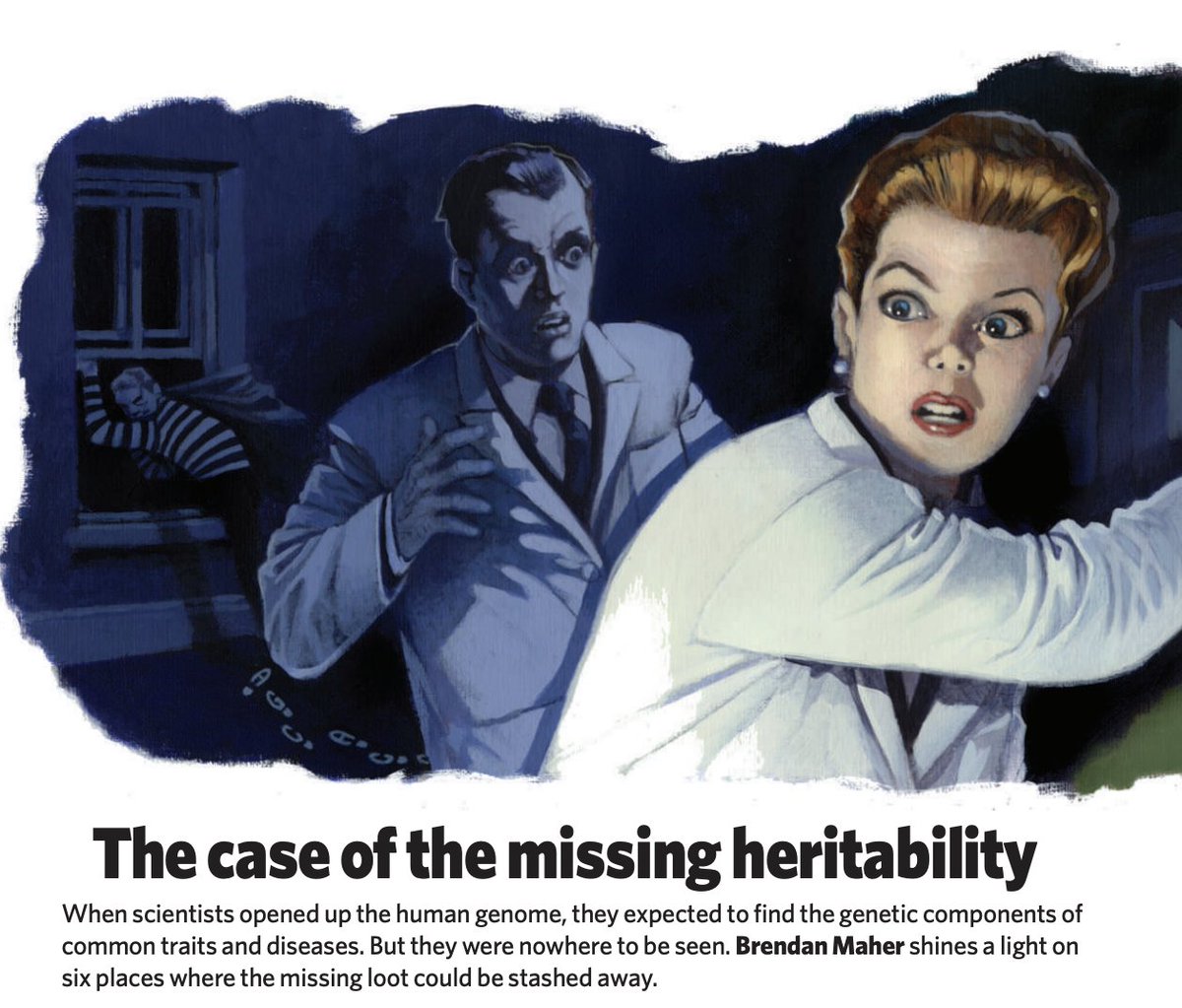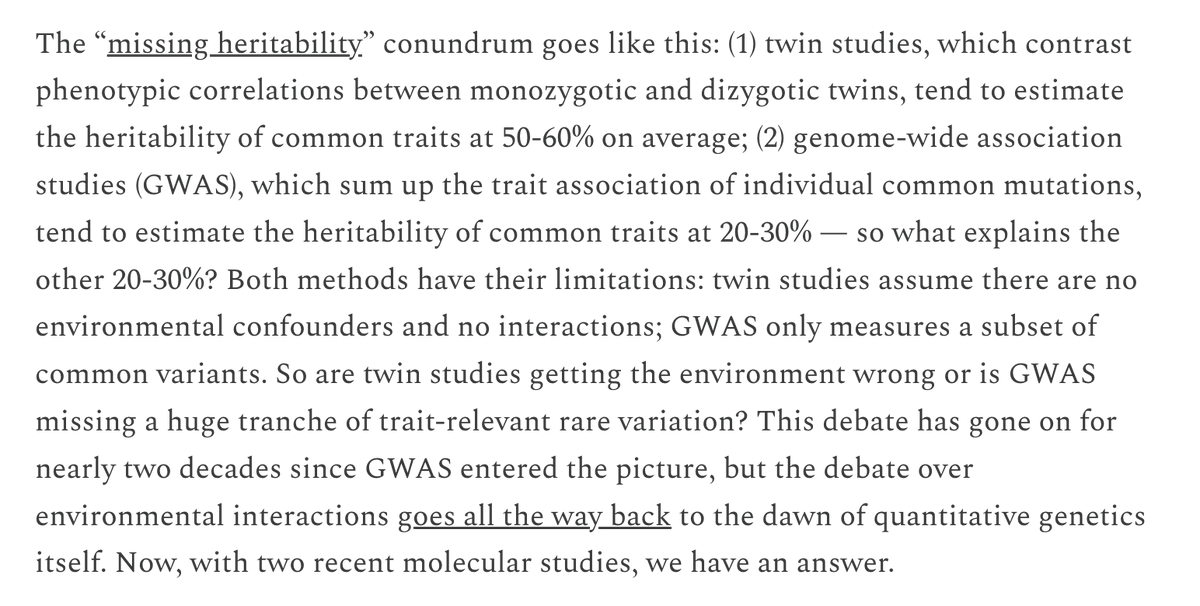I've written about race, genetic ancestry, analyses of large biobanks, and human history
I'll summarize the key points here 🧵: gusevlab.org/projects/hsq/#…

I'll summarize the key points here 🧵: gusevlab.org/projects/hsq/#…

Let's define some terms. Race is a social categorization of people into groups, typically based on physical attributes. Genetic ancestry is a quantification of genetic similarity to a reference population. While correlated, they have fundamentally different causes & consequences. 

We should care about causes, and race is a poor causal model of human evolution. In truth, genetic variation follows a "nested subsets" model, where all people eventually share ancestors, which is fundamentally different from race (see for yourself here: ). james-kitchens.com/blog/visualizi…


Formally, race-like models do not fit well to the genetic distances we observe even in highly geographically distinct populations with minimal admixture [Long et al 2009] (and as we'll see, mixture is very common). Trying to make a racial model work produces nonsense.




Consistent with nested subsets, a pair of individuals from Africa have more genetic differences than a pair from Africa/France, and the majority of those differences are *common* across all populations [Biddanda 2020]. Population-private common variants are very infrequent. 

Notably, before genetic data, race advocates predicted that most variation would be homozygous within racial groups and highly divergent. The truth is the opposite even for ancestry: if you condition out population labels you are still left with 85% of the genetic variation. 

But what about ancestry? Let's go through three core methods for analyzing ancestry in genetic data: dimensionality reduction (PCA), model-based clustering (STRUCTURE), and parametric model (admixture graphs). Because ancestry is relative, each approach has limitations.
1: PCA estimates eigenvectors of the sample relatedness matrix which, under simple ancestry models, are expected to recover population labels. Matrix theory shows that PCA is extremely sensitive with enough data, able to detect relationships down to a handful of generations.




But PCA is easily distorted by the sampling process: bigger populations will warp the PCA locations, even individuals within a single family can look like different populations. PCA also produces unusual artifacts when there is simple spatially locality in the data.






2: STRUCTURE clusters individuals as mixtures of a fixed set of (k) populations. It shares strengths with PCA (sensitive, interpretable) but also limitations (distorted by sampling and parameter choice). 

[Lawson 2018] provide many examples where STRUCTURE misses known, uh, structure; merges divergent populations together; finds false admixture; or models ancient genomes as mixtures of modern ones.






3: Admixture Graphs use allele-sharing statistics to fit population drift, splits, and mixtures. A very powerful approach but identifiability is a challenge: is the graph you found is significantly better than all other possible graphs? [Maier 2023] show it often is not. 

Got all that? Now let's look at some real data from biobanks. Again we see that race is a very poor model of human populations, which are continuous mixtures of multiple data sources with no clear boundaries or mapping to any folk racial constructs. 

As predicted, PCA is sensitive. When we zoom in on populations we see clines all the way down: county-level correlations among self-reported British whites; down to neighborhood level correlations in Chinese and Japanese biobanks. Continuous relationships at all scales.




I sometimes see the argument that, even if race is flawed, genetic ancestry can tell us the "true" races. But this is clearly wrong. These methods depend on a sampling process we cannot know, and real data is full of the mixtures and continuous relationships we just saw. 

This is even more apparent when looking at populations in history. Dynamic admixture, migration, and continuous structure is historically common and sometimes quite rapid. Geography-ancestry relationships have been rewritten countless times.






Yet again, historic models motivated in part by racial thinking presumed that populations largely evolved through "serial founder" events and developed in isolation. Genetic data shows us this is clearly not the case and our history is much more complicated. 

Finally, in Africa, we see the limits of even our sophisticated computational models. Highly complex structure and gene flow can fit models of deep separation or continuous migration equally well, even when including ancient DNA. Our genetic history in Africa remains a mystery!




In sum, we use models to understand the causal processes in our world and race is a very poor causal model for genetics. But even models of genetic ancestry have fundamental limitations in light of our complex and dynamic, nested human history. Much more work to be done!
/fin
/fin
@threadreaderapp unroll
• • •
Missing some Tweet in this thread? You can try to
force a refresh












